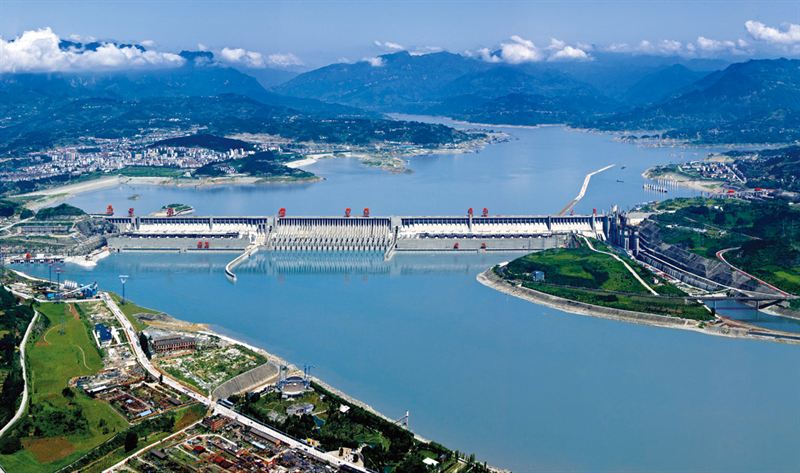
 Chinese Missile Frigates Confronts USS Dewey as U.S. Resumes FON Operations in South China Sea
Chinese Missile Frigates Confronts USS Dewey as U.S. Resumes FON Operations in South China SeaThe first U.S. Freedom of Navigation Operation (FONOP) under President Trump took place on Thursday (5/26) as the USS Dewey (paywall) sailed within 12 nautical miles of the contested Mischief Reef in the South China Sea. The FONOP comes at a time when the Trump administration has sent mixed signals about the continuation of FONOPs, rejecting three previous requests by U.S. officials.
China responded by sending two guided-missile frigates, "to identify and warn the USS Dewey that entered waters of China's Nansha Islands to leave," according to Defense ministry spokesman, Ren Guoqiang. China's Ministry of Foreign Affairs spokesman Lu Kang further warned the United States that it "risked severely disrupting negotiations between stakeholders." ASEAN and senior Chinese officials had just agreed on a "framework for a code of conduct with an official from Singapore (which currently co-ordinates ASEAN-China relations), who called the agreement a sign of 'steady progress.'" Citing Pro. Wu Xinbo of Fudan University, The Paper (link in Chinese) says it's unlikely that the latest FONOP will ratchet up tension between China and the U.S., and that the timing is possibly related the Shangri-La Dialogue to be held June 2-4 in Singapore. U.S. Defense Secretary Mattis is expected to reaffirm U.S. commitments in the South China Sea at this dialogue.
Was the FONOP intended to contest China's maritime claims? Probably, but U.S. officials have only confirmed on conditions of anonymity. Pentagon Spokesperson Capt. Jeff Davis said to CNN, "We operate in the Asia-Pacific region on a daily basis, including in the South China Sea." Julian Ku on Lawfare reported that Commander Gary Ross would not confirm or deny whether the FONOP was meant to specifically challenge the Chinese claims in the region, but as the The Wall Street Journal writes, a FONOPs inherent purpose is to challenge, "excessive maritime claims," and continues, "Such operations must take place within 12 nautical miles of an island or feature's territorial waters to legally constitute a freedom of navigation patrol." According to the U.S. State Department, a FONOP involves not only military units, "but also bilateral and multilateral consultations with other governments in an effort to promote maritime stability and consistency with international law, stressing the need for and obligation of all States to adhere to the customary international law rules and practices reflected in the Law of Seas Convention." Despite participating in UN Law of Seas (UNCLOS) negotiations in the 70s and early 90s, the U.S. has still not ratified the treaty.
 "Fresh Air" Speech Causes Controversy in China
"Fresh Air" Speech Causes Controversy in China"People often ask me: Why did you come to the University of Maryland? I always answer: Fresh air." This seemingly uncontroversial speech given by a graduating University of Maryland senior, Shuping Yang, prompted a viral backlash in China. Many users linked to an article published on Collegedaily.cn (link in Chinese), which said that this speech represented another incident of the U.S. "magnifying prejudices" against the Chinese people. It jabbed at New York's notorious subway conditions with a dated photo of strewn trash. It also called on Chinese to dispel harmful stereotypes that have been perpetuated, using American political cartoons from the 19th century showing Chinese men donning queues and shackled by the "anti-Chinese bill."
By Tuesday, posts relating to the "fresh air" speech had been viewed as much as 50 million times, according to the BBC. Chinese students studying in the U.S. also took to Facebook to both support the speech and also take issue with the fact that Shuping Yang was from Kunming, the "city of eternal spring," with much better air quality than most of the country. A group of Chinese students at the University of Maryland posted a video on YouTube saying that "80 percent of what Shuping said today were deceptions and lies," and that "she does not represent all of us international students." Yang apologized on Weibo saying she, "deeply loves her motherland" and intended only "to share her experience of studying overseas, not to negate or denigrate my country or my hometown."
Even China's Foreign Ministry chimed in, responding to a question on whether Chinese students have an obligation to make "responsible comments about China" when they are abroad. Spokesman Lu Kang said it wasn't a "diplomatic issue," but said "many young Chinese students are now studying overseas, whose views and perceptions of some things may change and evolve after going abroad. But as long as they love their country deep down their heart (sic) and stands ready to contribute to it, I believe the Chinese government will encourage, support and welcome them." See the full comments here.
 Taiwan legalizes Same-Sex MarriageTaiwanese judges ruled in favor of same-sex marriage, stating that current law, "which states that only a man and a woman can marry, violated constitutional guarantees. It gave the legislature two years to amend the Civil Code." The Washington Post quoted Ying Xin, executive director of the Beijing LGBT Center as saying, "This is significant for all of Asia." "Taiwan legalizes homosexuality" (#台湾同性恋合法#) became a top trending topic on Weibo in Mainland China. SupChina reported, "Most comments are broadly supportive of the Taiwanese court ruling, but there are voices decrying a descent into decadence." Quartz reported, "Many in China are Claiming Taiwan's Same-sex Marriage Victory as Their Own," citing Mainland articles referring to Taiwan as a Chinese Province, which is unsurprising considering new directives from Xinhua News Agency dictating how Taiwan can be covered in China. This page (link in Chinese) using the "Taiwan legalizes homosexuality" hashtag has been viewed 26 millions times.
Taiwan legalizes Same-Sex MarriageTaiwanese judges ruled in favor of same-sex marriage, stating that current law, "which states that only a man and a woman can marry, violated constitutional guarantees. It gave the legislature two years to amend the Civil Code." The Washington Post quoted Ying Xin, executive director of the Beijing LGBT Center as saying, "This is significant for all of Asia." "Taiwan legalizes homosexuality" (#台湾同性恋合法#) became a top trending topic on Weibo in Mainland China. SupChina reported, "Most comments are broadly supportive of the Taiwanese court ruling, but there are voices decrying a descent into decadence." Quartz reported, "Many in China are Claiming Taiwan's Same-sex Marriage Victory as Their Own," citing Mainland articles referring to Taiwan as a Chinese Province, which is unsurprising considering new directives from Xinhua News Agency dictating how Taiwan can be covered in China. This page (link in Chinese) using the "Taiwan legalizes homosexuality" hashtag has been viewed 26 millions times. On This Week in Chinese History...in 2006The Three Gorges Dam was officially opened in Hubei province on May 20, 2006. The Three Gorges is a hydroelectric dam that spans the Yangtze River. It is the world's largest power station in terms of installed capacity. In 2014 the dam generated 98.8 terawatt-hours and had the world record, but was surpassed by Itaipú Dam in Brazil in 2016. In addition to producing electricity, the dam is also intended to increase the Yangtze River's shipping capacity and reduce the potential for floods downstream by providing flood storage space. China regards the project as monumental success socially and economically, with the design of state-of-the-art large turbines, and a move toward limiting greenhouse gas emissions. However, despite its benefits, the project remains controversial as it has flooded archeological and cultural sites and displaced some 1.3 million people.
On This Week in Chinese History...in 2006The Three Gorges Dam was officially opened in Hubei province on May 20, 2006. The Three Gorges is a hydroelectric dam that spans the Yangtze River. It is the world's largest power station in terms of installed capacity. In 2014 the dam generated 98.8 terawatt-hours and had the world record, but was surpassed by Itaipú Dam in Brazil in 2016. In addition to producing electricity, the dam is also intended to increase the Yangtze River's shipping capacity and reduce the potential for floods downstream by providing flood storage space. China regards the project as monumental success socially and economically, with the design of state-of-the-art large turbines, and a move toward limiting greenhouse gas emissions. However, despite its benefits, the project remains controversial as it has flooded archeological and cultural sites and displaced some 1.3 million people.
Prepared by China-US Focus editorial teams in Hong Kong and New York, this weekly newsletter offers you snap shots of latest trends and developments emerging from China every week, while adding a dose of historical perspective.
- 2017-05-19 The Belt and Road Forum Concludes Leaving Behind Mixed Reactions
- 2017-05-12 Beijing, Washington Reach First Trade Deal Under 100-day Plan
- 2017-05-05 Degree of Autonomy Decaying in Hong Kong?
- 2017-04-28 Aircraft Carriers, Submarines, and Jetliners: Now Made in China
- 2017-04-21 Green Cards & Red Lines
- 2017-04-14 U.S Beef for Chinese Chicken? More Hollywood Films in China?
- 2017-04-07 The Xi-Trump Summit in Florida
- 2017-03-31 Google Makes a Comeback to China?
- 2017-03-24 Xi and Tillerson Trade Phrases
- 2017-03-17 Sec. Tillerson Visits Asia ahead of Xi-Trump Summit
- 2017-03-10 Defending China's Defense Budget
- 2017-03-03 The Korean Peninsula Draws Headlines
- 2017-02-22 CPC Meets to Reaffirm Commitments in Anticipation of "Two Sessions"
